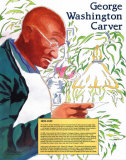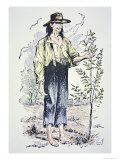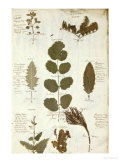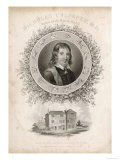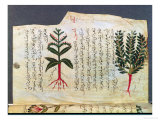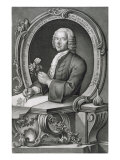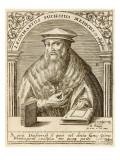|
|
|
|
|
|
|
|
Johnny Appleseed, née Chapman
b. 9-26-1774; Leominster, Massachusetts
d. c 1845-47; Indiana
Johnny Appleseed, a pioneer nurseryman and missionary for the Church of the New Jerusalem, or Swedenborgian Church, introduced apple trees to large parts of frontier Ohio, Indiana, and Illinois, today's Midwest.
Born John Chapman just prior to the Revolutionary War, he became a legend in his own time for his kindness and botany skills.
• Johnny Appleseed
|
|
|
|
Frederic Edward Clements
b. 9-16-1874; Lincoln, NE
d. 7-26-1945
Botanist and professor Frederic Edward Clements developed the ecological theory that vegetation cover does not represent a permanent condition but can be understood as a sequence of stages resembling the development of an individual organism.
|
|
|
|
|
|
|
Nicholas Culpeper
b. 10-18-1616; England
d. 1-10-1654; London - tuberculosis
Nicholas Culpeper, a physician whose systematic use of herbals was a key development in the evolution of modern pharmaceuticals, also translated Latin medical and herbal texts into vernacular English.
His halfway house practice in Spitalfields (contraction of ‘hospital fields’ referring to “The New Hospital of St Mary without Bishopgate” founded in 1197), brought health care to the poor. He also used astrology in his practice, perhaps a precursor to modern psychology.
Nicholas Culpeper quotes-
• “Three kinds of people mainly disease the people - priests, physicians and lawyers - priests disease matters belonging to their souls, physicians disease matters belonging to their bodies, and lawyers disease matters belonging to their estate.” Thulesius
• “Many a times I find my patients disturbed by trouble of Conscience or Sorrow, and I have to act the Divine before I can be the Physician. In fact our greatest skill lies in the infusion of Hopes, to induce confidence and peace of
mind.” Thulesius
• “I have written seventeen books of Physick (besides those already published) which will discover to you the whole method of physick, both according to Paracelsus and Galen's practice.” A Physical Directory, or a Trans. of the London Dispensary, 1649
• Culpeper's Complete Herbal
• Heal Thyself: Nicholas Culpeper and the Seventeenth-Century Struggle to Bring Medicine to the People
• Nicholas Culpeper, Herbalist of the People (online bio)
|
|
|
|
|
|
|
|
|
|
Leonhart Fuchs
b. 1-17-1501; Wemding, Duchy of Bavaria
d. 5-10-1566; Tübingen
Leonhard Fuchs (sometimes spelled Leonhard Fuchs), Otto Brunfels and Hieronymus Bock (Tragus) are considered the three founding fathers of botany.
Fuch, a physician, was professor of medicine at Tübingen and provided instruction in medicinal plants and founded one of the first German botanical gardens.
FYI - Ever wonder where the word fuchsia comes from? Fuchs name was immortalized by the plant "Fuchsia triphylla, flore coccineo" first described on the island of Hispaniola c. 1698. The color fuchsia describes the color of the flowers plants.
• grain posters
|
|
|
previous page | top | next
science > biology > botany > botantists list > a-b | C-F | g-l | m-o | p-z
|
|
I have searched the web for visual, text, and manipulative curriculum support materials - teaching posters, art prints, maps, charts, calendars, books and educational toys featuring famous people, places and events - to help teachers optimize their valuable time and budget.
Browsing the subject areas at NetPosterWorks.com is a learning experience where educators can plan context rich environments while comparing prices, special discounts, framing options and shipping from educational resources.
Thank you for starting your search for inspirational, motivational, and educational posters and learning materials at NetPosterWorks.com. If you need help please contact us.
|
|
|











